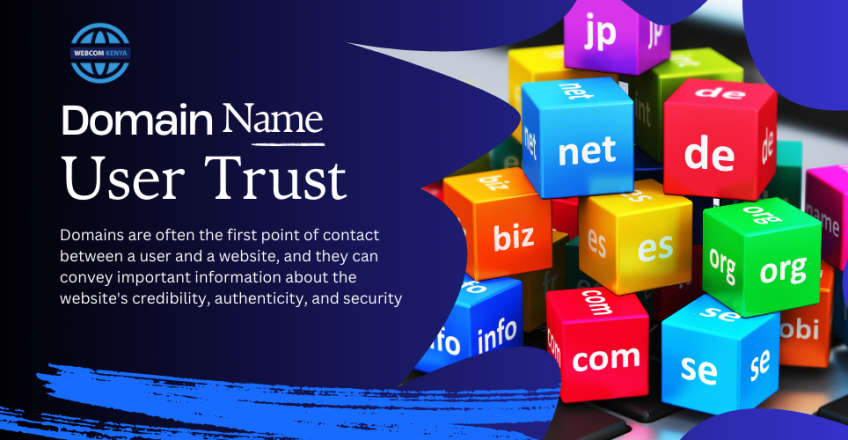
The Influence of Domain Names on User Trust
In the digital realm, where countless websites beckon, “The Influence of Domain Names on User Trust” is a critical and recurrent theme. This topic delves into the pivotal role that domain names play in shaping user perceptions and instilling confidence. It explores how domain names impact user trust by influencing recognition, professionalism, and security. We will examine the relevance of domain extensions, the significance of SSL certificates, and the role of transparency. Through an insightful analysis, “The Influence of Domain Names on User Trust” sheds light on how web addresses serve as the initial gateway to trust or skepticism, guiding users to their online destinations with confidence.

- Branding and Recognition: A well-chosen domain name that aligns with a brand name or a business’s identity can enhance recognition and trust. Users are more likely to trust and remember a domain name that is consistent with the brand they are familiar with.
- Professionalism: A domain name that is clear, concise, and free of typos or unusual characters can convey professionalism. Users are more likely to trust a website with a professional-sounding domain name.
- Relevance: A domain name that reflects the content or purpose of the website can build trust by showing users that they have arrived at the right place. Users tend to trust websites that meet their expectations.
- Security: Users associate certain domain extensions (e.g.,.co.ke, .com, .org, .gov) with higher levels of trust and security. Websites using well-known and reputable domain extensions are often viewed as more trustworthy.
- SSL Certificates: Websites with secure sockets layer (SSL) certificates display “https://” in their domain names, indicating that the connection is encrypted and secure. Users are more likely to trust websites with SSL certificates, especially for transactions involving sensitive information like credit card details.
- Consistency: Domain consistency across a brand’s online presence, including its website, social media, and email addresses, builds trust. Inconsistent domain names can raise suspicions of phishing or fraud.
- Avoiding Suspicious Elements: Domain names with excessive hyphens, numbers, or unusual characters may appear suspicious to users. Cybercriminals often use such domain names for phishing scams.
- Length: Short and concise domain names are easier to remember and type accurately, reducing the risk of users mistyping the URL and landing on a potentially harmful site.
- Avoiding Misleading Elements: Domain names that mislead users by imitating well-known brands or containing false information can erode trust and lead to legal consequences.
- Reviews and Reputation: If users have encountered positive reviews or recommendations about a website associated with a particular domain name, it can positively influence their trust in that domain.
- Transparency: Transparency in domain registration details, including accurate contact information and visible ownership, can enhance user trust. Anonymous or hidden domain registrants may raise suspicions.
- Age and History: Older domains with a history of trustworthy behavior can gain more trust over time. New or unknown domain names may need to work harder to establish trust.
- User Experience: A domain name that leads to a website with a good user experience, including fast loading times, mobile optimization, and clear navigation, can reinforce trust.
Secure your online presence with Webcom Kenya – Trusted Registrar for Domain Name Registration today!
In summary, domain names are an integral part of a website’s identity and can significantly impact user trust. Choosing a domain name that aligns with branding, professionalism, relevance, security, and user expectations can enhance trust and contribute to a positive online reputation. Conversely, poorly chosen or suspicious domain names can erode trust and deter users from engaging with a website.
For more updates and insights, follow us on Twitter @Webcom Kenya.


